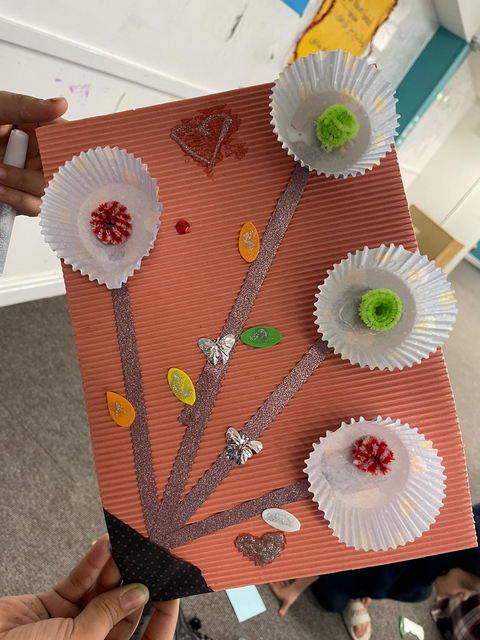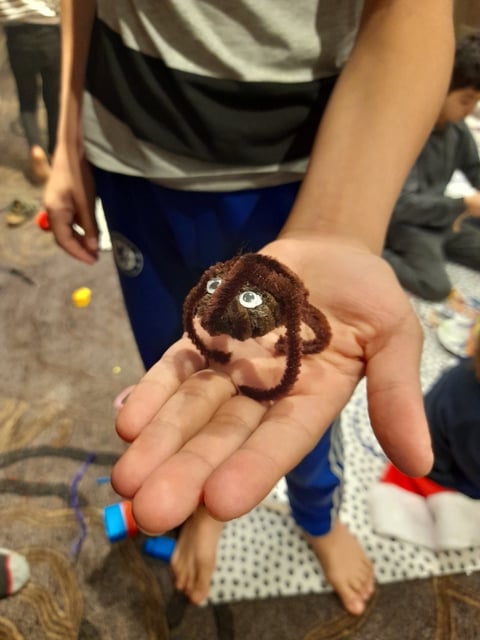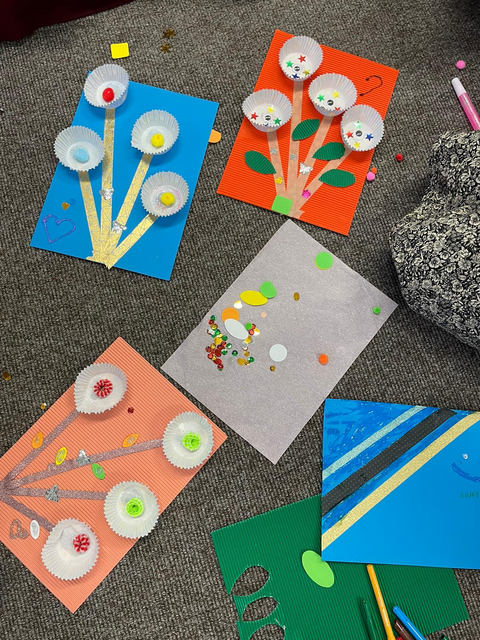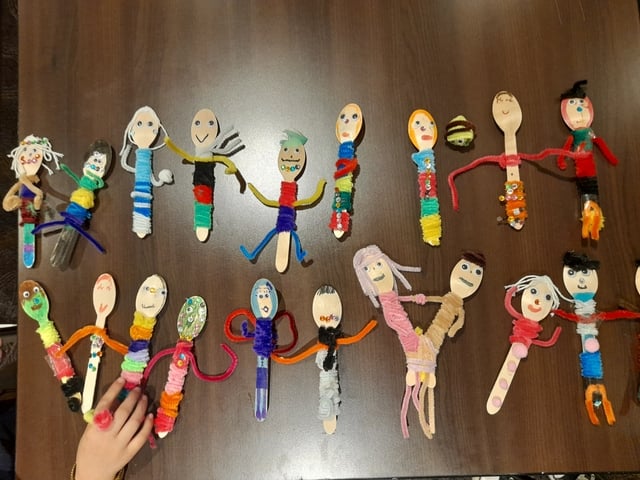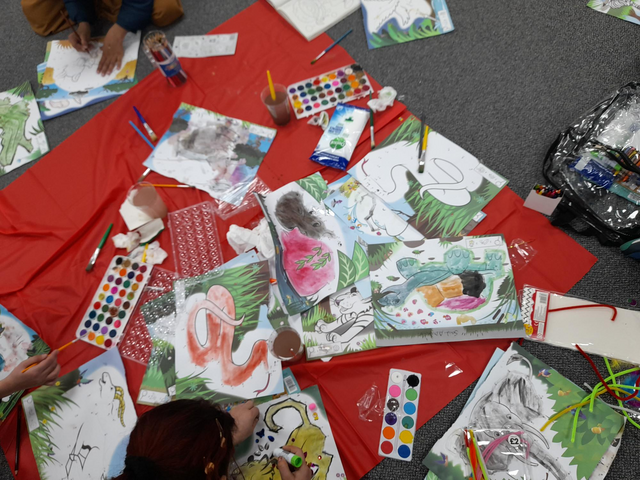Charlotte from Hopscotch Women’s Centre spoke to us about their collaboration with the Student-Led Project UCL Student Hospital Fun Team. It was lovely to hear about the impact that this project has had on the participants. You can learn all about it in this Profile Piece!
Can you briefly describe the activities that your participants were involved in?
They were running play activities, mostly games, free play, and crafts, with Afghan refugee children who were living in interim hotels for refugee families in Camden.
We had rooms in those hotels that were our designated family rooms, so the volunteers would arrive, they'd bring their materials, some of the rooms had a few toys already, and they would run activities there after school.
Sounds great! How did the collaboration between your organisation and the Fun Team project work?
I'd say that the working relationship changed as the volunteers grew in confidence.
In the last academic year, almost all the volunteers were new to the project, so it took them a few weeks to settle in and get used to how the sessions ran. So we supported them more at first and we did a little induction with them. Then, as they grew more confident in their roles and working with the children, they would bring their own activities and materials, and they would design sessions based on what they'd grown to know the kids enjoyed and benefited from.
That makes sense, and why did your organisations decide to host one of our Student-Led Projects?
It's a couple of different reasons. Back in September 2021 when we first started working with the cohort of Afghan families who had just arrived in Camden, we were trying to fill as many gaps as we could and support the families in as many different ways as we could. One thing that we felt was needed was a space and opportunity for the children to play safely and feel like children, for them to exercise their right to play, because it's a very heavy situation, a lot of them arrived with trauma and their families were going through a lot.
We thought that as well as addressing the initial basic needs of the families, we also needed to make sure that there was room for joy and that the children were still being provided for in that way as well.
So we did this for the children, but then it also benefited the adults as well. Over the two years we've been working with them, they've been going through a lot continuously in different ways, and it's really hard to live in a hotel room, one room or two rooms, with your entire family and lots of children. So giving them a couple of hours during the week when they could send the children off to play knowing they would be safe, was really important for them as well to be able to get a breather.
What impact did this project have on the participants and/or your organisation?
I think partly it was just that the children knew they would have a space that was just for them and just for their enjoyment. I think some of the kids are under pressure to do family responsibilities. Some of the older ones from 9 to 13-ish, they've got lots of younger siblings that they often have to help look after, so to be able to come to a space where it was actually just for them to play was really good for them.
It allowed them to still be children despite everything else that was going on for them.
Even if they tried to bring their baby sister or brother, we'd actually have to say – “no, we have to bring the baby back to the room because we don't want you here looking after the baby, we want you here enjoying this time and space for you”.
That was really impactful, every day after school children would come up to me and ask if there was playing today, they wanted it every single day! It was something that they really looked forward to, which was really nice. It was an outlet for their energy. I think, they are 10 year old kids, they come home from a whole day at school and that's still not enough for them, they need to do more. So yes, this was really good.
I think another good thing, which wasn't necessarily the intention but was something that ended up being impactful, was that it gave them another space to practise English. When they're just playing amongst themselves sometimes they speak English, but sometimes they don't because they understand each other's languages, so there's not always a need to speak English when it's just them. Obviously, they're learning English at school, most of the kids are fluent by now because it's been a couple of years but in the beginning being in a space where the volunteers didn't understand Dari and Pashto and they had to speak English with them, I think it was really good for them. Kids learn languages very quickly, so it was just another space where they could feel confident communicating in this new language and feel that the volunteers were hearing them and understanding them and respecting what they were saying. It was another boost for them.
I also think it was good for the kids to have positive role models that they could talk to and relate to. The children enjoyed spending time with volunteers from different backgrounds, a lot of whom were medical students, and who many of the children felt like they had similar aspirations to. To see young people they could relate to actually achieving the things the children wanted to achieve was massive for them.
There was a little girl I remember, after they had run a science themed session, she came out and she said, “wow, that was amazing, I'm going to be a doctor!”. I think it left a really positive impression on the kids.
It sounds like a very special project!
Yes, we were very happy to have worked with Fun Team, I think it was one of the strongest partnerships we had from the start. We always tried to make it work because we knew how impactful it was.
What advice would you give to another organisation considering whether to host one of our Student-Led Projects?
A good question. I think to have realistic expectations, that it's going to take a little while for everything to settle and everyone to get used to what they're doing. I think for the for the host organisation, you're very used to how everything works and what the complexities of the issue that you're working alongside are, but for student volunteers coming in, especially in this context that we were in, I think it can be quite overwhelming.
So I think it's important to make sure you've got staff from your organisation who are willing to support the volunteers to settle and make sure that they are aware of everything and they know who to speak to if they've got questions or concerns. For example, one thing that we made sure we did with every partner that we worked with, including the UCL Fun Team, was that we delivered trauma and cultural awareness training. Just because those were two issues that we had highlighted as more prevalent, and that people in this organisation needed a certain amount of awareness around that. The families arrived with a lot of trauma that was then manifesting in different ways, and also Afghan culture is so different to British culture, and we can't assume that everyone understands the differences and what's OK to do and what's not. So we delivered those trainings to make sure everyone was on the same page.
So I think anyone working with other Student-Led Projects in the future, if there are any issues or things that you know are not common knowledge but are really important to make sure that the partnership runs smoothly, it’s important that some training or initiation around that is delivered.
It makes it really worth it, the effort you put in and the support you provide in the beginning is then outweighed by the amount that the service users on the project get out of it.
We only needed to spend a few weeks putting extra work in to settle the volunteers and make sure everyone was feeling OK and they knew what they were doing, and once we had done that and the volunteers were confident, we would have months and months of a project where the kids would get a lot of joy out of it, and they would be able to take their minds off the bigger worries in life for a while. I can imagine it would be a similar case in in a lot of different partnerships.
It's great to hear that the effort you’ve put in was worth it!
Yes, and the volunteers have put in so much effort as well, they would plan every week, they would go above and beyond they're really invested in the children which made everything work so much better.
Certain volunteers were really really committed, there was a couple of young people that ended up collecting donations for a little pop-up library in the in the hotel with children's books, and they would collect books from their friends and bring them in for the library. We didn't ask them to do this, they just did because they cared. Things like that were special.
If your school or organisation is interested in partnering with one of our Student-Led Projects? Find out more information here!
